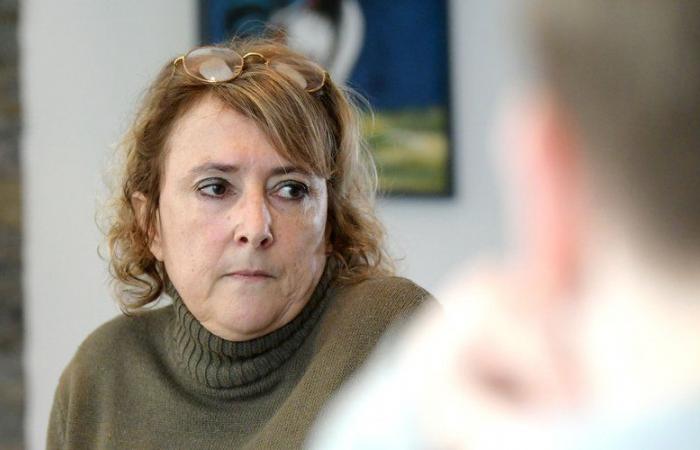
Extended at the last minute for six months, on December 18, the experimentation with therapeutic cannabis should stop at the end of June, time to organize “weaning” for the 1,850 patients suffering from serious pathologies included in the protocol. Pascal Douek, from Sète, Sandra Rey, teacher in Caissargues (Gard), Amélie Ribeiro-Dias, from Tarbes, experience it as a trauma.
Extended at the last minute for six months, on December 18, the experimental use of therapeutic cannabis benefits from a reprieve which does not provide relief to patients. In France, 1,850 people have been included in a very supervised cannabis access protocol since March 25, 2021: under very specific conditions, they have access to a CBD/THC mixture, cannabidiol, now sold to the general public, associated with active ingredient, still prohibited.
For a long time, the benefits felt made it possible to envisage easier access to the drug, from January 1, 2025. Political uncertainty, the reluctance of part of the medical profession, the stubborn taboos and easy shortcuts around everything that touches on psychotropic drugs, have, for the moment, put an end to the hypothesis.
“They signed my death warrant,” says Sandra Rey, 53, a teacher, from her house in Caissargues (Gard) where the Christmas decoration gives a false image of happiness.
Pathologies that allow entry into the protocol
To enter the protocol, supervised by the National Medicines Safety Agency (ANSM), with monitoring entrusted to candidate hospital teams, you must be in a therapeutic impasse in the management of pain in four pathologies: neuropathic pain, certain forms of drug-resistant epilepsy, certain rebellious symptoms in oncology, the painful spasticity of multiple sclerosis or other pathologies of the central nervous system. Access is also open in palliative situations.
“Endure the unbearable”
“I was 36 years old, we were on vacation with our two children in Saint-Jean-Pied-de-Port when I felt the first pain like a urinary infection”says Sandra Rey. For seventeen years, the neuropathic pain associated with what turned out to be pudendal neuralgia had not let go.
In a myriad of drugs tested, only medical cannabis helps “to bear the unbearable”, testifies the Gardoise, who has not been able to work for two years. She is in her thirty-fourth month of treatment. “Cannabis is not a magic medicine but it is essential in the few tools I have to cope with pain which I rate at a level of 9 out of 10”.
Clinging to a cane which helps her to move, seated on an adapted seat which allows her to stand up straight without condemning her to lie down, her hands trembling, on the verge of tears, Sandra Rey says she is ready to consider euthanasia in Belgium, rather than “go back”: “It was my last hope in the hell I was going through. I went back to a pain level of 9 out of 10, I want to scream.”
An interest recognized by health authorities
On November 20, 2023, the Directorate General of Health issued a report evaluating the experimentation with cannabis for medical use. He reports a “positive number” from the end of the first year, “which tends to confirm the feasibility of the cannabis prescription and delivery circuit”.
On the effectiveness of the treatment, the report notes, “in all indications of the experiment, a statistically significant and lasting improvement in pain thanks to medical cannabis”. Pathology by pathology, the interest is obvious: “For neuropathic pain in particular, “79% of patients reported severe and unbearable pain” upon inclusion in the protocol, they “Only 29% now rate their pain as severe or unbearable, with the benefit of pain that they describe as moderate to mild from 3 months and up to 12 months of follow-up”says the general directorate of health.
“In multiple sclerosis, a significant improvement in painful spasticity is observed as well as a reduction in the number of spasms and stiffness,” she adds. “In epilepsy, the scores of the different effectiveness scales show a significant reduction in the frequency of seizures”, in oncology, cannabis has “a positive effect beyond the treatment of pain”, and the effect is also described as “positive” in palliative care.
Intended to verify the possibility of setting up a supply circuit, in France, for patients, it also raises difficulties: “The prescription relay in community medicine remains poorly developed and concerns 10% of patients”raises the report.
But the evaluation concludes “the feasibility of the circuit for prescribing and dispensing cannabis for medical use, both in terms of securing the different stages and in its practical implementation”.
The wild withdrawal, which she has imposed on herself for several weeks, with doses of painkillers which do not calm her down, even “Oxycodone, twice as powerful as morphine, which has killed 500,000 people in the United States”, has already exhausted her.
“We have six months to fight”
“I am very worried, and very angry,” adds Pascal Douek, who had to give up his work as a doctor, the development of multiple sclerosis forcing him to now use a wheelchair.
In 2018, Pascal Douek “was part of the first strategic committee” set up by the Minister of Health Agnès Buzyn, to decide “the relevance of opening an experiment on medical cannabis”. With “a very heavy handicap and suffering”cannabis was his “last hope”, “other treatments no longer work”.
Cannabis gave him a “small improvement”et “it’s already very important” : “It’s easier, gentler with cannabis, I don’t dare imagine that I’ll go back”the Sétois is alarmed.
Eric Viel, head of department of the pain assessment and treatment center at Nîmes University Hospital: “It’s about time”
“It was about time” : pioneer in the use of therapeutic cannabis at the Nîmes University Hospital, since 2017, Professor Eric Viel believes that the experimentation must stop, while around thirty patients are still in the protocol, at the hospital. Not because he doesn’t believe in the benefits of medical cannabis: “If the indication is well placed, it works.” But he notes that the enthusiasm is not shared “by community pharmacies, nor by the majority of the medical profession”even though they are supposed to be part of the circuit.
“There will be a movement so that patients who see the effectiveness of the treatment can continue to benefit from it, this will happen in January”estimates the doctor.
In Tarbes, west of Occitanie, Amélie Ribeiro-Dias, 29, suffering from a rare disease, has also changed her life since she entered the therapeutic cannabis experimentation protocol in October 2021: “Before, I cried at the idea of having to wash my hair, my whole daily life had become an ordeal, with Tramadol, Lyrica, Lamaline at maximum doses, which improved my situation by 20% to 30 % I cried every night, it’s 80%, I live again, and I found life again on all levels, I can go out, work… I can no longer imagine my life without medical cannabis, it would be a return to absolute hell”, explains the young woman, who became a medical secretary after a professional reconversion.
Pascal Douek “does not withdraw”, he has “want to believe in it until the end”: “We started to be worried when we saw that there was no mention of medical cannabis in the PLFSS. There will be another one. It is also a political subject, and today, we do not have many interlocutors. We have written to the Prime Minister, we are waiting for the Minister of Health… we have six months to fight.”
DR
Mado Gilanton, president of Apaiser, patients association: “We are not going to give up”
Mado Gilanton is president of Apaiser, “Association to Help, Inform, Support Studies and Research for Syringomyelia & Chiari”, a rare disease whose symptoms are “close to multiple sclerosis”. “We are the association which, in France, addresses the subject of access to medical cannabis,” she recalls.
How do you react to the decision to extend the experimentation with medical cannabis… to give patients time to wean themselves off?
I was present at the last CTE, the temporary scientific committee set up to monitor the experiment. All the doctors testified to the dismay of their patients, who had found a solution to their problem, even if it does not work for everyone.
Already since March, the date on which the experiment was initially supposed to stop, it is no longer possible to enter into the protocol, the palliative care services are calling for help.
Was this outcome envisaged?
The use of medical cannabis was to enter into common law on January 1, 2025. Emmanuel Macron said he was in favor and even Marine La Pen. We had two big supporters, Olivier Véran, then Aurélien Rousseau, who were very favorable to its use. But when Aurélien Rousseau resigned, personal opinions prevailed, and ministers took their information from Mildeca, the Interministerial Mission to Combat Drugs and Addictive Behaviors. One in two users is over 50 years old, we know the damage cannabis causes among young people, we are not at all in this situation.
We saw no drift or increase in dosage. Side effects were seen in 20% of users, including digestive problems, drowsiness, two or three serious effects that required immediate discontinuation of medical cannabis. But we are far from the Tramadol situation!
Are you still hopeful for the future?
Since September, I have had many meetings in the world of health, and everyone agrees: therapeutic cannabis is effective, and the French sector is ready. 91% of French people are in favor of its use. Everything is regulated, there are only five indications while there are 25 in Australia, we have removed the use of flowers, which could pose a problem… Countries like Spain rely on experimentation French, and 23 European countries have legalized the use of medical cannabis.
The problem today is the lack of political courage, the Ministry of the Interior takes care of health. It’s a big waste. But we’re not going to give up.





